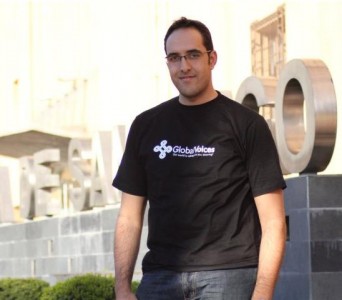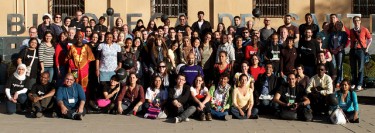
Tarek outside Santiago's Library, Chile
Tarek Amr [en] is a young Egyptian data networks architect and blogger [ar] in addition to being an author [en] and a translator in Global Voices Online, which he joined in 2007. In this short conversation, he tells us more about himself, about his contribution in GV and most of all about his experience in the Egyptian Revolution.
Hello Tarek, you state in your Arabic blog that you don't really like talking about yourself, but that step is a must in order to introduce GV authors and translators to our readers. Therefore, we would like to ask you to tell us, who is Tarek Amr? A Muslim engineer? An Atheist doctor ? A socialist barber ?
Hello Thalia, well in my blog, I was kind of mocking those who tend to place themselves and more than that, they place others in specific frames and judge their writings, based on those frames. Speaking about myself, I am engineer school graduate and I'm working in telecommunications and networks security. Besides my interest in blogging started from the fact that it represented a new technology, that I should experiment. My first posts focused on technology issues and then, bit by bit, I started writing about myself and about the society around me and how I perceive it to the point that I seldom blog about technical matters now. I also joined Global Voices four years ago or a little bit less.
Our second traditional question: tell us about your journey with GV
I joined GV in the second half of 2007. At that time, Egyptian bloggers had an electronic mailing group and we heard that GV needed new authors from Egypt. Before that, I used to hear a lot about GV and read articles there or noticed their logo on many blogs and the idea of presenting what is in blogs to people in Egypt or abroad appealed to me a lot. My enthusiasm hasn't stopped since then because I always considered that conveying our voice to the world as a bright idea especially with the huge number of fallacies spread on our society by traditional media outlets and the failure of our media to promote the right image. Of course, I don't know if I succeeded in doing so. This, I leave to GV readers to decide. What I am sure is that I am benefiting each day from my presence in such a project, because I am getting to discover daily new things about parts of the world, I wouldn't have known about, if it wasn't for GV. Also during those years, I met a lot of wonderful people from all over the world [en].
Sometimes, I cover countries other than Egypt [en], when there is something worth writing about and there is no one available at that moment such as Yemen and Iraq [en] for example. I wrote once about the Argentinian football team for the only reason that I support that team and I wanted to do so. So as you notice, one of GV's most important merits is the margin of freedom given to authors in selecting the topics and events they report and I believe this makes us closer to the reader than the mainstream sources, because ultimately we are just conveying people's opinions to the readers.
I also tried translating a couple of articles into Arabic, within the Lingua Project framework [ar], but it's obvious that my skills in Arabic translation [ar] are not that good. Translating is time consuming for me and I think it is evident given my rare participation in that project. Nevertheless, it's a pretty good experience, and I will repeat it in the future.
You are very active on the net especially in social media (three blogs, one flickr account, another one on Facebook, needless to mention GV and maybe other platforms). What place does the internet in general occupy in your life and those tools in particular ?
I forgot to tell you, that apart from blogging I am also into painting and taking photographs, therefore my use of accounts such as Twitter, flickr, Good Reads and last fm is mainly to satisfy personal hobbies such as photography or to learn about new books or even new musical bands worth listening to, and this possible with Good Reads and other platforms that I use to communicate with others. At the end, I consider myself, to be connected 24/7 on the net, especially that my job as a telecommunication engineer tightens that link and I believe that most of us are in this situation in one way or another. Accordingly my hobbies and activities in the virtual world are somehow the reflection of those in the real one. Besides that, having more than one blog is also due to my desire to separate what I write in Arabic from my English from pure technical posts, so that the reader who doesn't command one of the languages or is interested in a certain categories of topics doesn't get turned away. It is true that as a result of that distinction, I don't give each blog the necessary time as it was when I had just one blog, but that is inevitable.
You say in one of your blogs that didn't write a diary until you started blogging, i.e. 6 years ago and that you only resorted to the pen writing when the authorities blocked the internet [en] in the beginning of the revolution in Egypt. What do you have to say about this experience [en] ?
As much as I owe our educational system my ability to read and write for a long period of my life, I also owe it my aversion from reading and writing for a long period. We got used that the one who expresses what's inside school books is the one who obtains the highest grades, and not the one who expresses himself. So I wasn't accustomed to write and read topics that are not in the curriculum. But blogging saved me from this years later, because I learned how to write about topics not taught in the curriculum and thanks to it, I discovered creative bloggers and I also discovered books worth reading, but for a long time, writing remained associated with internet and the keyboard, until the internet was blocked during the revolution so I found myself resorting to the paper and pen for the first time in my adult life to write about what is happening around me using paper slips and a forgotten agenda.
How do you manage to conciliate between your work in internet security and others and the fact that you are an activist on the internet, based on freedom and breaking barriers ?
Actually I don't see much antagonism between networks security and freedom principle, since my job consists mostly of providing security means to individuals and companies against spying and penetration. It is true that those same techniques can be used for instance to block sites, but in the end, like any of the technology tools, it is a two-edged weapon, and no matter how long governments might try to block information, ultimately the will of the people will be victorious either by using counter-techniques or by developing new tools to make themselves heard. When internet was cut off in all Egypt, some resorted to dial up from some neighboring countries for example and Google provided “Speak 2Tweet” service [en].
Speaking of the Egyptian revolution, what is that distinguishes someone who is covering the events for GV right from the scene of events from those who report those events from abroad ?
I think it is the same difference between social media and conventional one, since relaying the information straight from the mouths of those who truly witnessed it makes somehow more dynamic and swift in conveying the news and also gives the topics we write about a human trait. This year for instance, the Pulitzer prize was withheld for the breaking news category.Times magazine explained this [en] by saying that the new media such as Twitter outstripped mainstream sources in this regard and they considered that the jury should take into account non-traditional media from now on. For example, when the former president pronounced a speech, conventional media focuses on analyzing the discourse itself, while we are more interested in the bloggers opinions and comments on it and most of the time their sarcastic remarks. Moreover, and many will disagree with me on this, but I don't believe in the impartiality of the media, because from one side I think that the reporter should ensure accuracy and clarity when conveying the various opinions without dropping or altering any element but I also don't see any problem in expressing one's opinion and bluntly, maybe this is due to the fact that I have never studied journalism and am used to blogging. In general, its true that we in GV, do not communicate our own point of view as authors, but at the end I am reporting bloggers’ views as it is without considering any editorial policies or political equations. I for example don't see a significant effect on our articles from a propaganda model and filters perspectives as described by Chomsky and Herman [en].
Is there anything you would like to end at the end of this interview ?
It might look as if I am siding with the social media against the traditional sources. It is true that deep inside I love social media, but the problem between old and new media dates back to the time I got involved with blogging and that debate hasn't been settled so far. Both genres are staying even if each influences and is influenced by the other, so I think both will persist at least in the near future, because each has its characteristics and deficiencies.
Thank you Tarek








3 comments
I’m a Tarek fan!
Great interview! I was especially intrigued by Tarek’s assertion that blogging helped him (re)discover an appreciation for reading and writing that the Egyptian education system had succeeded in suppressing.